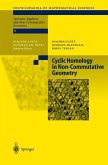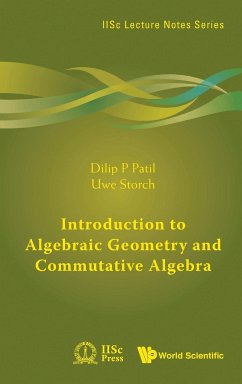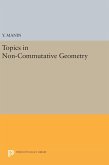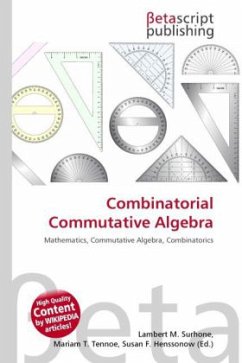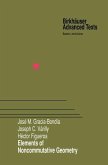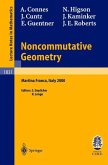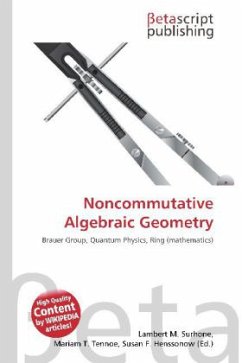Michael Bert:
Many years ago by now, indeed on the order of forty (I shudder to think), I was advised by UCLA's Richard Elman to study the book Introduction to Commutative Algebra by Atiyah and MacDonald (a book which I had the pleasure to review) and happily took his advice. It served me very well then, afterward, and does so still. Moreover, as the mathematical generations process, I am happy to report that I had occasion to use the book myself in a reading course a couple of years ago, with a very gifted student who is now going after his doctorate at Purdue. Suffice it to say, then, that Atiyah-MacDonald is a sine qua non in this arena of mathematical education. It is not the only text in the game, however, as must be the case. One reason is the heterogeneity of today's student body, even at the highest levels. Things have also changed a great deal as regards what one should know as he enters the fray of mathematical research and high-level teaching. So, in phase with this, the book under review states that "[it] should be thought of as an introduction to more advanced texts and research topics," which I guess pitches the book as something as a prelude to Atiyah-MacDonald. After all, that book is rather austere and famously (or notoriously) requires the reader to work like mad on the many fabulous but occasionally very sporty problems that book comes equipped with. Thus, despite its undeniable excellence, Atiyah-MacDonald is not every one's cup of tea.
Against this backdrop, then, the book under review is manifestly a more accessible and user-friendly text - which is not to say that the book is trivial: it certainly is not - and additionally distinguishes itself on a number of counts. For example, true to the Zeitgeist, Hoffman, Jia, and Wang spend a good deal of energy on Gröbner bases (which were not even in the air when I was a student) and accordingly give airplay to computational aspects of homological algebra that are very much on the scene today. As regards this latter orientation, the book's chapter on modules (over a ring) closes with a section titled "Computational Applications" which is rife with computer programs, all alien to me who still write my papers in long-hand with a fountain pen. This said, Chapter 3 is a good example of another virtue of this book, namely its thoroughness and breadth. The authors do a particularly good job on the subjects of projective and injective modules, tensor products, and flatness, for example. (These topics are particularly close to my heart because of the pleasure I had in learning about them from other sources than Atiyah-MacDonald, i.e. Rotman's beautifully encyclopedic Advanced Modern Algebra and Cartan and Eilenberg's Homological Algebra.)
I think this is a good and useful book, doing justice to a number of topics that are bound to figure prominently down the line (anyone's line). The authors spend a lot of time on graded objects, as well as complexes and their early inner life, all in the context of budding homological algebra. And they get pretty zealous, too: the end of the book sports coverage of local cohomology as well as "applications" such as Castelnuovo-Mumford regularity and MacRae's invariant (bringing to mind that, after all, much of the raison d'être of commutative algebra is algebraic geometry).
This book delivers what it promises, namely, fundamental (and serious) aspects of commutative algebra plus introductions to current research themes. To wit: "each chapter consists of two parts: fundamentals and ... applications, which make it suitable for courses of various lengths." Additionally, the book is pitched at a good level: after a first year graduate course in abstract algebra, the reader should be able to dive in and swim. It looks to be a valuable pedagogical contribution.
Michael Bert:
Many years ago by now, indeed on the order of forty (I shudder to think), I was advised by UCLA's Richard Elman to study the book Introduction to Commutative Algebra by Atiyah and MacDonald (a book which I had the pleasure to review) and happily took his advice. It served me very well then, afterward, and does so still. Moreover, as the mathematical generations process, I am happy to report that I had occasion to use the book myself in a reading course a couple of years ago, with a very gifted student who is now going after his doctorate at Purdue. Suffice it to say, then, that Atiyah-MacDonald is a sine qua non in this arena of mathematical education. It is not the only text in the game, however, as must be the case. One reason is the heterogeneity of today's student body, even at the highest levels. Things have also changed a great deal as regards what one should know as he enters the fray of mathematical research and high-level teaching. So, in phase with this, the book under review states that "[it] should be thought of as an introduction to more advanced texts and research topics," which I guess pitches the book as something as a prelude to Atiyah-MacDonald. After all, that book is rather austere and famously (or notoriously) requires the reader to work like mad on the many fabulous but occasionally very sporty problems that book comes equipped with. Thus, despite its undeniable excellence, Atiyah-MacDonald is not every one's cup of tea.
Against this backdrop, then, the book under review is manifestly a more accessible and user-friendly text - which is not to say that the book is trivial: it certainly is not - and additionally distinguishes itself on a number of counts. For example, true to the Zeitgeist, Hoffman, Jia, and Wang spend a good deal of energy on Gröbner bases (which were not even in the air when I was a student) and accordingly give airplay to computational aspects of homological algebra that are very much on the scene today. As regards this latter orientation, the book's chapter on modules (over a ring) closes with a section titled "Computational Applications" which is rife with computer programs, all alien to me who still write my papers in long-hand with a fountain pen. This said, Chapter 3 is a good example of another virtue of this book, namely its thoroughness and breadth. The authors do a particularly good job on the subjects of projective and injective modules, tensor products, and flatness, for example. (These topics are particularly close to my heart because of the pleasure I had in learning about them from other sources than Atiyah-MacDonald, i.e. Rotman's beautifully encyclopedic Advanced Modern Algebra and Cartan and Eilenberg's Homological Algebra.)
I think this is a good and useful book, doing justice to a number of topics that are bound to figure prominently down the line (anyone's line). The authors spend a lot of time on graded objects, as well as complexes and their early inner life, all in the context of budding homological algebra. And they get pretty zealous, too: the end of the book sports coverage of local cohomology as well as "applications" such as Castelnuovo-Mumford regularity and MacRae's invariant (bringing to mind that, after all, much of the raison d'être of commutative algebra is algebraic geometry).
This book delivers what it promises, namely, fundamental (and serious) aspects of commutative algebra plus introductions to current research themes. To wit: "each chapter consists of two parts: fundamentals and ... applications, which make it suitable for courses of various lengths." Additionally, the book is pitched at a good level: after a first year graduate course in abstract algebra, the reader should be able to dive in and swim. It looks to be a valuable pedagogical contribution.
Many years ago by now, indeed on the order of forty (I shudder to think), I was advised by UCLA's Richard Elman to study the book Introduction to Commutative Algebra by Atiyah and MacDonald (a book which I had the pleasure to review) and happily took his advice. It served me very well then, afterward, and does so still. Moreover, as the mathematical generations process, I am happy to report that I had occasion to use the book myself in a reading course a couple of years ago, with a very gifted student who is now going after his doctorate at Purdue. Suffice it to say, then, that Atiyah-MacDonald is a sine qua non in this arena of mathematical education. It is not the only text in the game, however, as must be the case. One reason is the heterogeneity of today's student body, even at the highest levels. Things have also changed a great deal as regards what one should know as he enters the fray of mathematical research and high-level teaching. So, in phase with this, the book under review states that "[it] should be thought of as an introduction to more advanced texts and research topics," which I guess pitches the book as something as a prelude to Atiyah-MacDonald. After all, that book is rather austere and famously (or notoriously) requires the reader to work like mad on the many fabulous but occasionally very sporty problems that book comes equipped with. Thus, despite its undeniable excellence, Atiyah-MacDonald is not every one's cup of tea.
Against this backdrop, then, the book under review is manifestly a more accessible and user-friendly text - which is not to say that the book is trivial: it certainly is not - and additionally distinguishes itself on a number of counts. For example, true to the Zeitgeist, Hoffman, Jia, and Wang spend a good deal of energy on Gröbner bases (which were not even in the air when I was a student) and accordingly give airplay to computational aspects of homological algebra that are very much on the scene today. As regards this latter orientation, the book's chapter on modules (over a ring) closes with a section titled "Computational Applications" which is rife with computer programs, all alien to me who still write my papers in long-hand with a fountain pen. This said, Chapter 3 is a good example of another virtue of this book, namely its thoroughness and breadth. The authors do a particularly good job on the subjects of projective and injective modules, tensor products, and flatness, for example. (These topics are particularly close to my heart because of the pleasure I had in learning about them from other sources than Atiyah-MacDonald, i.e. Rotman's beautifully encyclopedic Advanced Modern Algebra and Cartan and Eilenberg's Homological Algebra.)
I think this is a good and useful book, doing justice to a number of topics that are bound to figure prominently down the line (anyone's line). The authors spend a lot of time on graded objects, as well as complexes and their early inner life, all in the context of budding homological algebra. And they get pretty zealous, too: the end of the book sports coverage of local cohomology as well as "applications" such as Castelnuovo-Mumford regularity and MacRae's invariant (bringing to mind that, after all, much of the raison d'être of commutative algebra is algebraic geometry).
This book delivers what it promises, namely, fundamental (and serious) aspects of commutative algebra plus introductions to current research themes. To wit: "each chapter consists of two parts: fundamentals and ... applications, which make it suitable for courses of various lengths." Additionally, the book is pitched at a good level: after a first year graduate course in abstract algebra, the reader should be able to dive in and swim. It looks to be a valuable pedagogical contribution.
Michael Bert:
Many years ago by now, indeed on the order of forty (I shudder to think), I was advised by UCLA's Richard Elman to study the book Introduction to Commutative Algebra by Atiyah and MacDonald (a book which I had the pleasure to review) and happily took his advice. It served me very well then, afterward, and does so still. Moreover, as the mathematical generations process, I am happy to report that I had occasion to use the book myself in a reading course a couple of years ago, with a very gifted student who is now going after his doctorate at Purdue. Suffice it to say, then, that Atiyah-MacDonald is a sine qua non in this arena of mathematical education. It is not the only text in the game, however, as must be the case. One reason is the heterogeneity of today's student body, even at the highest levels. Things have also changed a great deal as regards what one should know as he enters the fray of mathematical research and high-level teaching. So, in phase with this, the book under review states that "[it] should be thought of as an introduction to more advanced texts and research topics," which I guess pitches the book as something as a prelude to Atiyah-MacDonald. After all, that book is rather austere and famously (or notoriously) requires the reader to work like mad on the many fabulous but occasionally very sporty problems that book comes equipped with. Thus, despite its undeniable excellence, Atiyah-MacDonald is not every one's cup of tea.
Against this backdrop, then, the book under review is manifestly a more accessible and user-friendly text - which is not to say that the book is trivial: it certainly is not - and additionally distinguishes itself on a number of counts. For example, true to the Zeitgeist, Hoffman, Jia, and Wang spend a good deal of energy on Gröbner bases (which were not even in the air when I was a student) and accordingly give airplay to computational aspects of homological algebra that are very much on the scene today. As regards this latter orientation, the book's chapter on modules (over a ring) closes with a section titled "Computational Applications" which is rife with computer programs, all alien to me who still write my papers in long-hand with a fountain pen. This said, Chapter 3 is a good example of another virtue of this book, namely its thoroughness and breadth. The authors do a particularly good job on the subjects of projective and injective modules, tensor products, and flatness, for example. (These topics are particularly close to my heart because of the pleasure I had in learning about them from other sources than Atiyah-MacDonald, i.e. Rotman's beautifully encyclopedic Advanced Modern Algebra and Cartan and Eilenberg's Homological Algebra.)
I think this is a good and useful book, doing justice to a number of topics that are bound to figure prominently down the line (anyone's line). The authors spend a lot of time on graded objects, as well as complexes and their early inner life, all in the context of budding homological algebra. And they get pretty zealous, too: the end of the book sports coverage of local cohomology as well as "applications" such as Castelnuovo-Mumford regularity and MacRae's invariant (bringing to mind that, after all, much of the raison d'être of commutative algebra is algebraic geometry).
This book delivers what it promises, namely, fundamental (and serious) aspects of commutative algebra plus introductions to current research themes. To wit: "each chapter consists of two parts: fundamentals and ... applications, which make it suitable for courses of various lengths." Additionally, the book is pitched at a good level: after a first year graduate course in abstract algebra, the reader should be able to dive in and swim. It looks to be a valuable pedagogical contribution.


